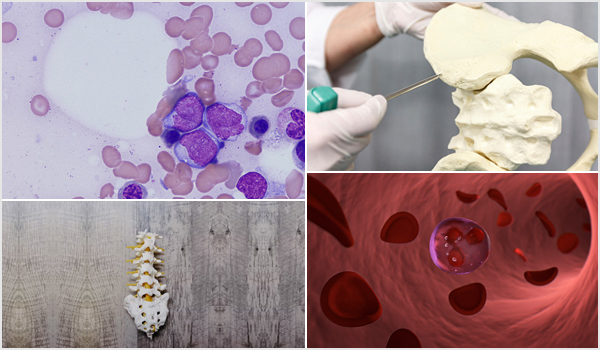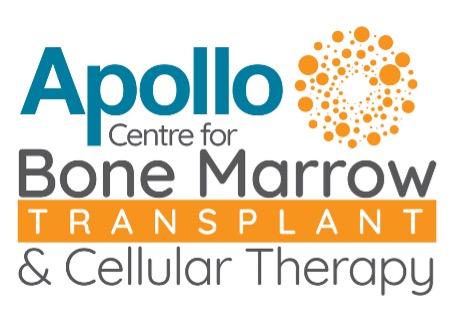Bone Marrow Transplant (BMT) in Delhi
What Are The Types Of BMT?
The patient's own stem cells or those from another individual (called the “donor”) can be extracted
- Autologous transplant – This is simply called the transplantation of Autologous Tissue. The patient's stem cells are extracted by performing a bone marrow harvest, or apheresis, of the peripheral blood stem cells and then returned to the patient following relevant treatment.
- Allogenic Transplant - The patient and the donor both have the same HLA type. A HLA matched donor, generally a brother or sister, provides stem cells via bone marrow harvest or apheresis (peripheral blood stem cells). The following groups of people are eligible to become allogeneic bone marrow donors:
- Identical Twins - An allogeneic transplant from a twin is known as a syngeneic transplant. For this type of transplant, identical twins are found to be a perfect genetic match.
- Unrelated transplants (UBMT or MUD, for matched unrelated donor) - For this type of transplant, HLA-matched stem cells are obtained from a distant or unrelated donor, who is normally identified through national registries.
- Umbilical cord blood transplant – In this type, the stem cells are extracted from an infant's umbilical cord shortly after birth. The stem cells are then examined, classified, numbered, and stored before getting them ready for the transplant.
Why Is It Done?
Bone marrow transplants are administered for the following reasons:
- Replacing a gene that is missing, as is the case in Thalassemia, Sickle Cell Disease, and many other genetic diseases. These are medical conditions in which an individual is healthy, except for one defective gene, which can be replaced to cure the disease.
- Allows for usage of high doses of anti-cancer drugs, which may lead to bone marrow loss. The bone marrow usually takes a long period of time to fully recover without stem cell support, resulting in complications and high incidence of infections or bleeding. Infused stem cells help blood cells heal quickly. It reduces the risk of low blood counts caused by marrow suppression significantly. As a result, it is a type of "Supportive Therapy", rather than cancer treatment in and of itself. This is true for both autologous (self) and allogeneic (third-party) transplants.
- Some "Graft versus Disease activity," also known as the "Graft v Leukemia impact," observed in allogeneic transplants, particularly in acute myelogenous leukemia.
What Can Be Expected?
A bone marrow transplant procedure involves the following steps:
- The bone marrow transplant team conducts an exhaustive examination prior to the transplant. All additional therapy options are explored and assessed in terms of risk and benefit.
- Multiple tests to evaluate the patient's blood and organ functions are performed as part of a comprehensive medical history and physical examination (for example, heart, kidney, liver, and lungs).
- A patient may visit the transplant center up to 10 days before the surgery for hydration, assessment, central venous line installation, and other preparations. A central venous line, often known as a catheter, is surgically implanted in a vein in the chest. During treatment, blood products and medications will be administered through the catheter.
Preparation for a bone marrow transplant varies based on the type of transplant, the condition that requires it, and the patient's tolerance for particular medications.
- The preparations frequently contain large doses of chemotherapy and/or radiation. This effective therapy is necessary to adequately treat the cancer and create space in the bone marrow for new cells to proliferate. Because of the effect on the bone marrow, this therapy is often referred to as ablative or myeloablative. The bone marrow is responsible for producing the majority of the blood cells in our bodies. The process of cell creation is stopped by ablative therapy, and the marrow becomes empty. To make room for the new stem cells to proliferate and establish a new blood cell manufacturing mechanism, the marrow must be empty.
- The marrow transplant is given by a central venous catheter into the bloodstream after the chemotherapy and/or radiation has been given. Placing the marrow into the bone is not a surgical process, although it is equivalent to receiving a blood transfusion. The stem cells enter the bone marrow and begin to reproduce and form new, healthy blood cells.
- Following the transplant, comprehensive care is provided to prevent and treat infections, treatment side effects, and issues. Frequent blood tests, constant monitoring of vital signs, precise assessment of fluid input and output, daily weigh-ins, and safe and clean surroundings are done and ensured after the procedure.
What Are The Benefits Of BMT?
Some of the benefits of undergoing a BMT are:
- In case of Hodgkin's & Non-Hodgkin's Lymphoma, BMT is the sole option for treatment.
- Although Myeloma is not completely curable, BMT can be advised in the preliminary level of treatment as it increases the survival rate significantly.
- To increase the chances of cure in the case of Leukemia, BMT is recommended.
- Few other diseases such as the following can be cured by BMT:
- Thalassemia
- Aplastic anemia
- Chronic myeloid leukemia
- Many genetic disorders, particularly with single genetic defects
Conclusion:
Many factors such as health conditions, age of the patient, purpose of the transplant influence the bone marrow transplant and it depends on the patient's response also. For treating cancer, BMT is most recommended procedure by doctors as it is less invasive and has a comparatively lesser healing time.
Meet Our BMT Specialists
-

Dr. Gaurav Kharya
Pediatric Haemato Oncology Specialist 20+ Years of Experience -

Dr Shishir Seth
Bone Marrow Transplant 20+ Years of Experience -

Dr Amita Mahajan
Pediatric Oncology 20+ Years of Experience
Consult Our Doctor For Free 1860-500-1066
Book an appointmentWhy Choose Apollo For Bone Marrow Transplant (BMT)?
At Apollo, our objective is to make high-quality healthcare accessible to everyone. For the benefit of humanity, we are dedicated to achieving and maintaining excellence in education, research, and healthcare. The Apollo Hospitals' blood and bone marrow transplantation department in Delhi has performed over 410 transplants with a high success rate. For overseas patients, Apollo Hospitals in Delhi is a trusted name in bone marrow transplant since the facility not only has a highly qualified BMT team, but also has very strict infection control standards, which are crucial for patients of the bone marrow transplant treatment.

- State-of-art Infrastructure
- Most experienced team of doctors
- Largest experience in BMT for SCD
- Speciality in alternative donor BMT's (Haploidentical and MUD) for various hematological diseases (benign or malignant)
- Excellent success rates
- iinnovative protocols to improve transplant outcomes in resource limited settinginnovative protocols to improve transplant outcomes in resource limited settings.
- BMT for NFE2 Deficiency, BMT for Griscelli Syndrome etc.
Hear Apollo's Success Stories
- Baby Shristhi underwent a successful bone marrow transplant under the care of Dr Gaurav Kharya
- Hemyaa underwent transplant under Dr Gaurav Kharya, the best bone marrow transplant doctor in Delhi
- Dr Gaurav Kharya treated Erick for successful bone marrow transplant
- Little Idaunderwent a bone marrow transplant under Dr Gaurav Kharya
Frequently Asked Questions (FAQs)
Is Bone Marrow Transplantation (BMT) procedure painful?
What is the success rate of a bone marrow transplant?
How long does it take to recover from BMT?
What disqualifies you from getting a bone marrow transplant?
Are there any complications related to BMT?
- 1. Organ Rejection
- 2. Organ Failure
- 3. Complications linked to the use of anesthesia, including death
- 4. Postsurgical complications, such as infection
- 5. Bleeding or other complications during the procedure
- 6. Higher risk of infections and other illnesses due to anti-rejection or other transplant-related drugs.


